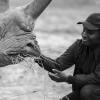When the first case of Covid-19 was reported in my country, Kenya, I was at the peak of my master’s program. I had just finished my data analysis and was working on my manuscripts and thesis. The next stage after this was data dissemination. But this was never to happen. When the first case was reported, it was very clear that life is not going to be the same again! Because such are the times when a country is free to deprive its citizens their rights and freedom? But I also felt it right that those rights and freedoms had to be suppressed, as at then……………probably out of fear. I had just had my daughter, she was two-months old then, and I would not wish for freedom of movement to be the reason behind us having that ‘weird’ bug in the house. But then, what about science? What about keeping the promise of data dissemination? What about the planned interventions? Ok, I am not guilty of any of the crimes that were committed here, particularly the failure to keep these promises. It had to happen. I could not move back to my study site and give feedback; ban on social gathering, ban on intercounty movement; the need for social distancing. Wait for it, ……. maybe I could have done my dissemination and interventions online, virtually, right? But no.
My interventions involved education and creating awareness regarding my topic. However, the devil in the room, digital illiteracy was staring, and glaring at us with the brightest of light in its eyes, like it is telling the whole country to rethink its education system. My study, that was evaluating effective pasture management strategies in an arid and semi-arid savanna grassland in Kenya, was at the rangelands of Laikipia, commonly inhabited by the Maasais and the Samburu community. In these areas, even basic literacy is an issue. Therefore, when the whole world had to move digital, it was even a double tragedy to them; no access to basic literacy, no access to digital literacy, no access to computer and most important, language barrier. I am inclined to think that this was not my case alone. There are several researchers and students, globally, who had to cut short their studies, never to complete them, especially the most crucial part, data dissemination to the community and intervention. So, what happened to your science during the covid-19 pandemic? Did you complete it? Did you go back and pick it up from where you had left it at? Did it disappear never to be seen again? What plans do you have after reading this piece?
The end of my story is nice though. I went back and completed my research. In May 2022, I was recruited to be part of a training program dubbed the Women in Conservation Technology. This program is sponsored by WildLabs, Flora and Fauna in partnership with Ol Pejeta Conservancy. At the end of the training program, we were given a chance to pick a project of our choice and be funded to carry it to completion. Remember when I said I was not guilty? Yes, I went back to where I had stopped. I picked it up from there. The funding from this program enabled me to do my dissemination in the nice old way where social gathering is allowed. During the months of April-May 2023, I visited four (4) livestock markets in Laikipia and Kajiado county and a couple of homesteads. During every visit, I approached men who were mostly selling livestock, and women, mostly owning business stalls within livestock market areas and household heads to explain to them my study findings and the desirable recommendations for effective pasture management that they could apply. In addition, I provided them with flyers written in Swahili, with details on effective pasture management practices. So, at the end, I finally completed my research, despite how long it had taken me to!
Special appreciation to ARM, WildLabs, Flora and Fauna International, Ol Pejeta Conservancy for enabling me to complete a vital part of my project. I also acknowledge the National Geographic Society for funding my MSc Project (Grant number EC-44772R-18), KLEE Research Plots under Prof. Truman Young and the Mpala Research Centre for hosting my research.



Add the first post in this thread.